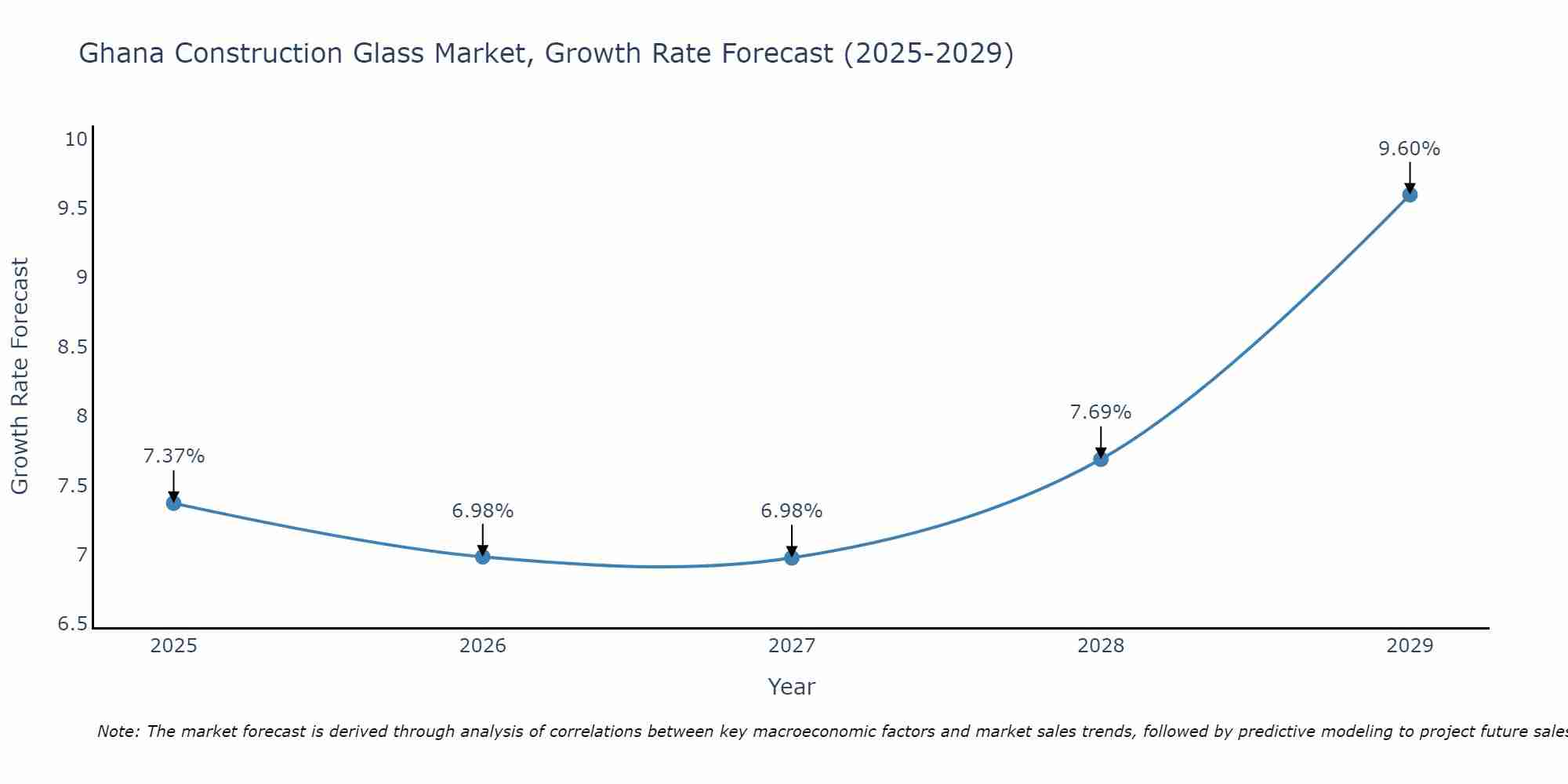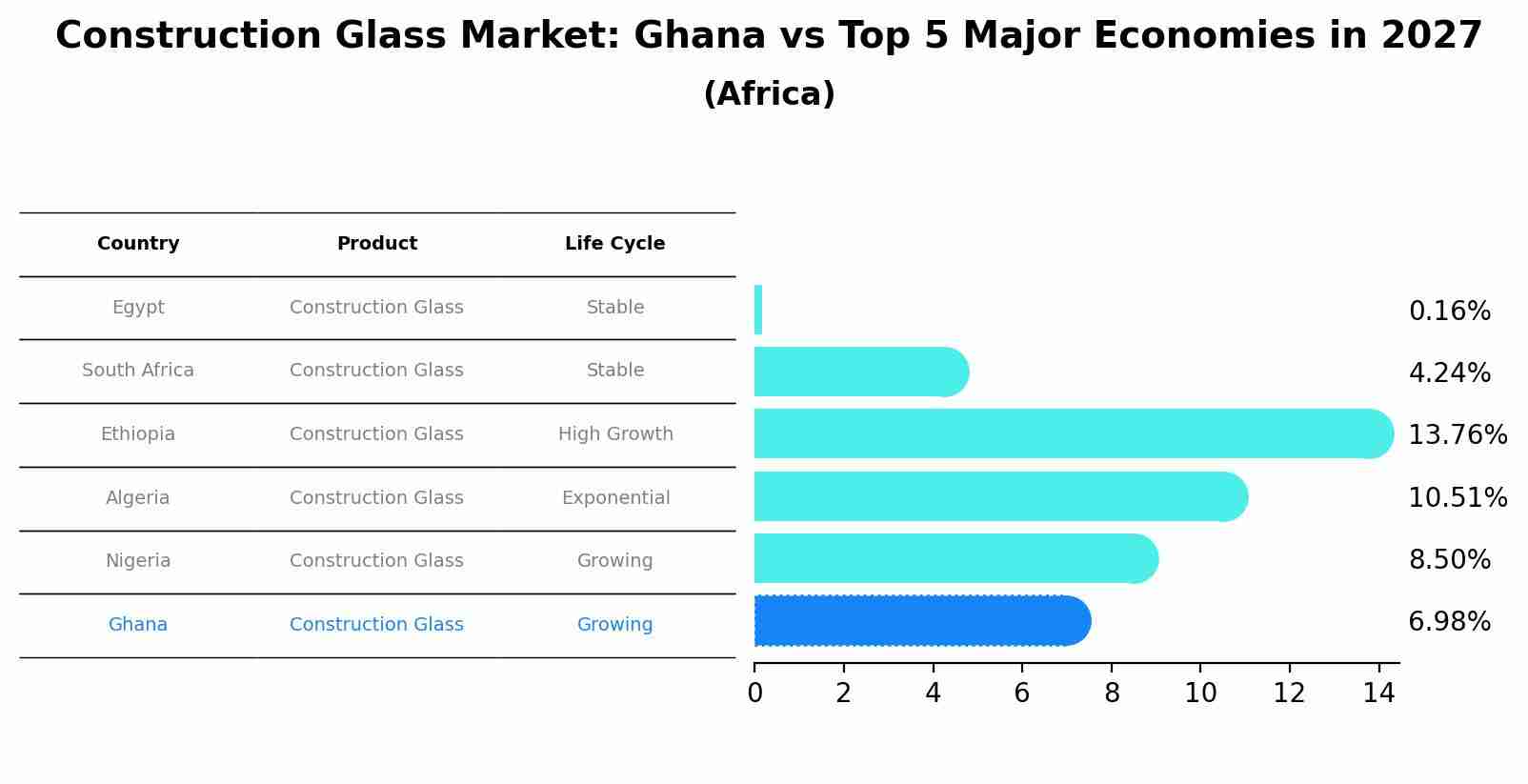Ghana Construction Glass Market (2025-2031) Outlook | Forecast, Growth, Industry, Size, Trends, Companies, Analysis, Value, Share & Revenue
| Product Code: ETC355376 | Publication Date: Aug 2022 | Updated Date: Apr 2025 | Product Type: Market Research Report | |
| Publisher: 6Wresearch | Author: Shubham Padhi | No. of Pages: 75 | No. of Figures: 35 | No. of Tables: 20 |
Ghana Construction Glass Market Size Growth Rate
The Ghana Construction Glass Market is projected to witness mixed growth rate patterns during 2025 to 2029. The growth rate starts at 7.37% in 2025 and reaches 9.60% by 2029.

Construction Glass Market: Ghana vs Top 5 Major Economies in 2027 (Africa)
The Construction Glass market in Ghana is projected to grow at a growing growth rate of 6.98% by 2027, highlighting the country's increasing focus on advanced technologies within the Africa region, where Egypt holds the dominant position, followed closely by South Africa, Ethiopia, Algeria and Nigeria, shaping overall regional demand.

Ghana Construction Glass Market Overview
The construction glass market in Ghana provides flat glass products used in architectural, automotive, and interior applications such as windows, doors, facades, and partitions. Construction glass offers properties such as transparency, thermal insulation, safety, and aesthetics, enhancing natural light, energy efficiency, and visual appeal of buildings and vehicles. In Ghana, the construction glass market is driven by the growth of urbanization, commercial real estate, and infrastructure projects, which create demand for high-quality and innovative glass solutions. Glass manufacturers and processors in Ghana offer a range of products, including float glass, tempered glass, laminated glass, and insulated glass units, along with customization and value-added services to meet the diverse needs of customers and projects.
Drivers of the market
The construction industry in Ghana is witnessing increased demand for energy-efficient, safety, and aesthetically pleasing glass solutions. Factors such as urbanization, infrastructure development, and architectural trends are driving growth in the construction glass market, with a focus on products such as low-emissivity glass, laminated glass, and insulated glass units.
Challenges of the market
Challenges in the construction glass market in Ghana include competition from imported glass products and limited domestic manufacturing capabilities. Moreover, energy efficiency requirements and safety standards may affect the selection and usage of construction glass for building facades and windows.
Government Policy of the market
Recognizing the importance of glass in modern architecture and building design, the government may introduce policies to support the construction glass market. These policies could include initiatives to promote research and development in glass manufacturing and processing technologies, provide incentives for the adoption of energy-efficient and safety-enhancing glass products, and establish standards and regulations for glass quality, performance, and installation. Additionally, the government may implement measures to support skills development and training in glass fabrication and installation, facilitate access to financing and technical assistance for glass manufacturers and suppliers, and promote awareness among architects, engineers, and builders about the benefits of using glass for natural lighting, thermal insulation, and aesthetic enhancement in construction projects.
Key Highlights of the Report:
- Ghana Construction Glass Market Outlook
- Market Size of Ghana Construction Glass Market, 2024
- Forecast of Ghana Construction Glass Market, 2031
- Historical Data and Forecast of Ghana Construction Glass Revenues & Volume for the Period 2021-2031
- Ghana Construction Glass Market Trend Evolution
- Ghana Construction Glass Market Drivers and Challenges
- Ghana Construction Glass Price Trends
- Ghana Construction Glass Porter's Five Forces
- Ghana Construction Glass Industry Life Cycle
- Historical Data and Forecast of Ghana Construction Glass Market Revenues & Volume By Chemical Composition for the Period 2021-2031
- Historical Data and Forecast of Ghana Construction Glass Market Revenues & Volume By Soda-lime for the Period 2021-2031
- Historical Data and Forecast of Ghana Construction Glass Market Revenues & Volume By Potash-lime for the Period 2021-2031
- Historical Data and Forecast of Ghana Construction Glass Market Revenues & Volume By Potash-lead for the Period 2021-2031
- Historical Data and Forecast of Ghana Construction Glass Market Revenues & Volume By Type for the Period 2021-2031
- Historical Data and Forecast of Ghana Construction Glass Market Revenues & Volume By Low-e Glass for the Period 2021-2031
- Historical Data and Forecast of Ghana Construction Glass Market Revenues & Volume By Special Glass for the Period 2021-2031
- Historical Data and Forecast of Ghana Construction Glass Market Revenues & Volume By Manufacturing Process for the Period 2021-2031
- Historical Data and Forecast of Ghana Construction Glass Market Revenues & Volume By Float Process for the Period 2021-2031
- Historical Data and Forecast of Ghana Construction Glass Market Revenues & Volume By Rolled/sheet Process for the Period 2021-2031
- Historical Data and Forecast of Ghana Construction Glass Market Revenues & Volume By Application for the Period 2021-2031
- Historical Data and Forecast of Ghana Construction Glass Market Revenues & Volume By Residential for the Period 2021-2031
- Historical Data and Forecast of Ghana Construction Glass Market Revenues & Volume By Commercial for the Period 2021-2031
- Historical Data and Forecast of Ghana Construction Glass Market Revenues & Volume By Others for the Period 2021-2031
- Ghana Construction Glass Import Export Trade Statistics
- Market Opportunity Assessment By Chemical Composition
- Market Opportunity Assessment By Type
- Market Opportunity Assessment By Manufacturing Process
- Market Opportunity Assessment By Application
- Ghana Construction Glass Top Companies Market Share
- Ghana Construction Glass Competitive Benchmarking By Technical and Operational Parameters
- Ghana Construction Glass Company Profiles
- Ghana Construction Glass Key Strategic Recommendations
Frequently Asked Questions About the Market Study (FAQs):
- Single User License$ 1,995
- Department License$ 2,400
- Site License$ 3,120
- Global License$ 3,795
Search
Thought Leadership and Analyst Meet
Our Clients
Related Reports
- Afghanistan Apparel Market (2026-2032) | Growth, Outlook, Industry, Segmentation, Forecast, Size, Companies, Trends, Value, Share, Analysis & Revenue
- Canada Oil and Gas Market (2026-2032) | Share, Segmentation, Value, Industry, Trends, Forecast, Analysis, Size & Revenue, Growth, Competitive Landscape, Outlook, Companies
- Germany Breakfast Food Market (2026-2032) | Industry, Share, Growth, Size, Companies, Value, Analysis, Revenue, Trends, Forecast & Outlook
- Australia Briquette Market (2025-2031) | Growth, Size, Revenue, Forecast, Analysis, Trends, Value, Share, Industry & Companies
- Vietnam System Integrator Market (2025-2031) | Size, Companies, Analysis, Industry, Value, Forecast, Growth, Trends, Revenue & Share
- ASEAN and Thailand Brain Health Supplements Market (2025-2031) | Strategy, Consumer Insights, Analysis, Investment Trends, Opportunities, Growth, Size, Share, Industry, Revenue, Segments, Value, Segmentation, Supply, Forecast, Restraints, Outlook, Competition, Drivers, Trends, Demand, Pricing Analysis, Competitive, Strategic Insights, Companies, Challenges
- ASEAN Bearings Market (2025-2031) | Strategy, Consumer Insights, Analysis, Investment Trends, Opportunities, Growth, Size, Share, Industry, Revenue, Segments, Value, Segmentation, Supply, Forecast, Restraints, Outlook, Competition, Drivers, Trends, Demand, Pricing Analysis, Competitive, Strategic Insights, Companies, Challenges
- Europe Flooring Market (2025-2031) | Outlook, Share, Industry, Trends, Forecast, Companies, Revenue, Size, Analysis, Growth & Value
- Saudi Arabia Manlift Market (2025-2031) | Outlook, Size, Growth, Trends, Companies, Industry, Revenue, Value, Share, Forecast & Analysis
- Uganda Excavator, Crane, and Wheel Loaders Market (2025-2031) | Strategy, Consumer Insights, Analysis, Investment Trends, Opportunities, Growth, Size, Share, Industry, Revenue, Segments, Value, Segmentation, Supply, Forecast, Restraints, Outlook, Competition, Drivers, Trends, Demand, Pricing Analysis, Competitive, Strategic Insights, Companies, Challenges
Industry Events and Analyst Meet
Whitepaper
- Middle East & Africa Commercial Security Market Click here to view more.
- Middle East & Africa Fire Safety Systems & Equipment Market Click here to view more.
- GCC Drone Market Click here to view more.
- Middle East Lighting Fixture Market Click here to view more.
- GCC Physical & Perimeter Security Market Click here to view more.
6WResearch In News
- Doha a strategic location for EV manufacturing hub: IPA Qatar
- Demand for luxury TVs surging in the GCC, says Samsung
- Empowering Growth: The Thriving Journey of Bangladesh’s Cable Industry
- Demand for luxury TVs surging in the GCC, says Samsung
- Video call with a traditional healer? Once unthinkable, it’s now common in South Africa
- Intelligent Buildings To Smooth GCC’s Path To Net Zero


















